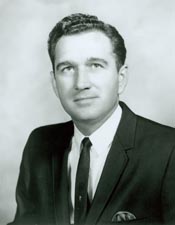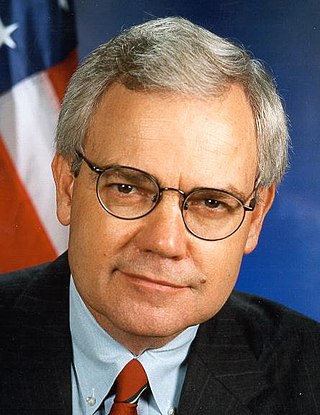
Howard Henry Baker Jr. was an American politician, diplomat and photographer who served as a United States Senator from Tennessee from 1967 to 1985. During his tenure, he rose to the rank of Senate Minority Leader and then Senate Majority Leader. A member of the Republican Party, Baker was the first Republican to be elected to the US Senate in Tennessee since the Reconstruction era.

Donald Kenneth Sundquist was an American businessman and politician who served as the 47th governor of Tennessee from 1995 to 2003. Prior to his governorship, he represented Tennessee's 7th congressional district in the United States House of Representatives from 1983 to 1995. He was a member of the Republican Party.

Leonard Ray Blanton was an American businessman and politician who served as the 44th governor of Tennessee from 1975 to 1979. He also served three terms in the U.S. House of Representatives, from 1964 to 1970. Though he initiated a number of government reforms and was instrumental in bringing foreign investment to Tennessee, his term as governor was marred by scandal over the selling of pardons and liquor licenses.

Frank Goad Clement was an American lawyer and politician who served as the 41st Governor of Tennessee from 1953 to 1959 and from 1963 to 1967. Inaugurated for the first time at age 32, he was the state's youngest and longest-serving governor in the 20th century. Clement owed much of his rapid political rise to his ability to deliver rousing, mesmerizing speeches. His sermon-like keynote address at the 1956 Democratic National Convention has been described as both one of the best and one of the worst keynote addresses in the era of televised conventions.

Gordon Weaver Browning was an American politician who served as the 38th governor of Tennessee from 1937 to 1939, and again from 1949 to 1953. He also served six terms in the U.S. House of Representatives, from 1923 to 1935, and was Chancellor of Tennessee's Eighth Chancery District in the 1940s. As governor, he stabilized state finances, doubled the state's mileage of paved roads, and enacted legislation to curb voter fraud. His victory in the hard-fought 1948 gubernatorial campaign helped break the power of Memphis political boss E. H. Crump.

Ross Bass was an American Congressman and United States Senator from Tennessee.

Robert Nelson Clement is an American politician and academic administrator. He is a member of the Democratic Party and served in the United States House of Representatives, representing Tennessee, from 1988 until 2003, when he retired to run unsuccessfully for the United States Senate.

Herbert Sanford Walters was a Democratic United States Senator from Tennessee from 1963 to 1964.

Dan Heflin Kuykendall was an American politician and businessman who served as a United States Representative from Tennessee's 8th and 9th congressional districts from 1967 until 1975. A member of the Republican Party, Kuykendall was the first Republican to be elected in the 8th district since 1920 and was the first to be elected in the 9th district since 1872.

The 1984 United States Senate elections were held on November 6, with the 33 seats of Class 2 contested in regular elections. They coincided with the landslide re-election of President Ronald Reagan in the presidential election. In spite of the lopsided presidential race, Reagan's Republican Party suffered a net loss of two Senate seats to the Democrats, although it retained control of the Senate with a reduced 53–47 majority. Democrats defeated incumbents in Illinois and Iowa, and won an open seat in Tennessee, while Republicans defeated an incumbent in Kentucky.

The 1978 United States Senate elections were held on November 7, in the middle of Democratic President Jimmy Carter's term. The 33 seats of Class 2 were contested in regular elections. Special elections were also held to fill vacancies.

The 1966 United States Senate elections were elections on November 8, 1966, for the United States Senate which occurred midway through the second term of President Lyndon B. Johnson. The 33 seats of Class 2 were contested in regular elections. Special elections were also held to fill vacancies. With divisions in the Democratic base over the Vietnam War, and with the traditional mid-term advantage of the party not holding the presidency, the Republicans took three Democratic seats, thereby breaking Democrats' 2/3rds supermajority. Despite Republican gains, the balance remained overwhelmingly in favor of the Democrats, who retained a 64–36 majority. Democrats were further reduced to 63–37, following the death of Robert F. Kennedy in June 1968.

The 1964 United States Senate elections were held on November 3. The 33 seats of Class 1 were contested in regular elections. Special elections were also held to fill vacancies. They coincided with the election of President Lyndon B. Johnson by an overwhelming majority, to a full term. His Democratic Party picked up a net two seats from the Republicans. As of 2023, this was the last time either party has had a two-thirds majority in the Senate, which allowed the Senate Democrats to override a veto, propose constitutional amendments, or convict and expel certain officials without any votes from Senate Republicans. However, internal divisions would have prevented the Democrats from having done so. The Senate election cycle coincided with Democratic gains in the House in the same year.

The 1982 United States Senate election in Tennessee was held on November 2, 1982, concurrently with other elections to the United States Senate in other states as well as elections to the United States House of Representatives and various state and local elections. Incumbent Democratic U.S. Senator Jim Sasser won re-election. Sasser defeated Republican Robin Beard.

The 1978 United States Senate election in Tennessee took place on November 7, 1978, to select the U.S. Senator from the state of Tennessee. Two-term popular incumbent Republican U.S. Senator, Howard Baker, who had served as United States Senate Minority Leader since 1977, ran for re-election against first-time candidate and Democratic Party activist Jane Eskind. Baker won re-election in the general election.

The 1952 United States Senate election in Tennessee was held on November 4, 1952. Incumbent Democratic Senator and President pro tempore of the Senate Kenneth D. McKellar ran for re-election to a seventh term in office but was defeated in the Democratic primary by U.S. Representative Al Gore Sr. Gore easily won the general election against Republican Hobart Atkins.

The 1940 United States Senate election in Tennessee was held on November 5, 1940. Incumbent Democratic Senator Kenneth D. McKellar was re-elected to a fifth term in office, defeating Republican Howard Baker.

The 1964 United States Senate election in Tennessee was held on November 3, 1964, concurrently with the U.S. presidential election as well the other U.S. Senate special election in Tennessee, as well as other elections to the United States Senate in other states as well as elections to the United States House of Representatives and various state and local elections.

The 1966 United States Senate election in Tennessee was held on November 8, 1966, concurrently with other elections to the United States Senate in other states as well as elections to the United States House of Representatives and various state and local elections. Republican nominee Howard Baker won the election, defeating Democratic nominee and Tennessee Governor Frank G. Clement with 55.7% of the vote.

The 1966 Tennessee gubernatorial election was held on November 8, 1966, to elect the next governor of Tennessee. Incumbent Democratic Governor Frank G. Clement was term-limited and was prohibited by the Constitution of Tennessee from seeking another term. Former Democratic Governor Buford Ellington defeated both Independent candidates H.L. Crowder and Charlie Moffett with 81.2% of the vote.



















